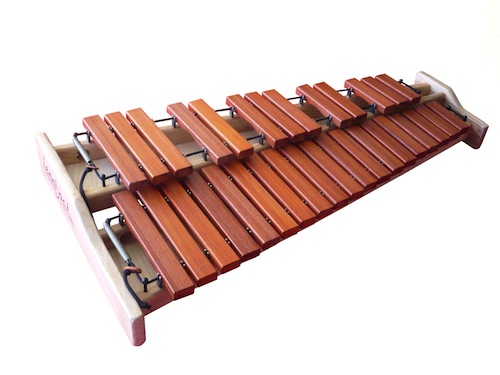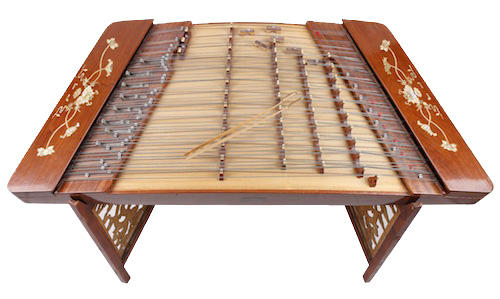Xylophone & Yangqin Mystery Cache
-
Difficulty:
-

-
Terrain:
-

Size:  (regular)
(regular)
Please note Use of geocaching.com services is subject to the terms and conditions
in our disclaimer.


This geo-art consists of twenty-six Unknown/Mystery caches which each have a puzzle to solve in order to determine the coordinates of the final location (a container with log book and in most cases some swag). The final location may be a park & grab along a graded forest road (accessible with a 2WD car), a reasonably short hike or drive up a Jeep trail (may require 4WD or a high ground-clearance vehicle), or a short hike up a foot trail.

Xylophone
The xylophone (from the Greek words ξύλον—xylon, "wood" + φωνή—phonē, "sound, voice", meaning "wooden sound") is a musical instrument in the percussion family that consists of wooden bars struck by mallets. Each bar is an idiophone tuned to a pitch of a musical scale, whether pentatonic or heptatonic in the case of many African and Asian instruments, diatonic in many western children's instruments, or chromatic for orchestral use.
The term xylophone may be used generally, to include all such instruments, such as the marimba, balafon and even the semantron. In the orchestra, the term xylophone refers specifically to a chromatic instrument of somewhat higher pitch range than the marimba. The term is also popularly used to refer to similar instruments of the lithophone and metallophone types. For example, the Pixiphone and many similar toys described by the makers as xylophones have bars of metal rather than of wood, and so are in organology regarded as a glockenspiels rather than as xylophones. This misnomer was also popularised by the Sooty show, in which the metal-barred instrument he plays is always described as a xylophone.

Yangqin
The trapezoidal yangqin (simplified Chinese: 扬琴; traditional Chinese: 揚琴; pinyin: yángqín) is a Chinese hammered dulcimer, originally from Persia (modern-day Iran). It used to be written with the characters 洋琴 (lit. "foreign zither"), but over time the first character changed to 揚 (also pronounced "yáng"), which means "acclaimed". It is also spelled yang quin or yang ch'in. Hammered dulcimers of various types are now very popular not only in China, but also Eastern Europe, the Middle East, India, Iran, and Pakistan. The instruments are also sometimes known by the names "santur" and "cymbalom".
The yangqin was traditionally fitted with bronze strings (though older Chinese stringed instruments used silk strings, resulting in their, and the yangqin's, categorisation as a silk, or "si" instrument), which gave the instrument a soft timbre. This form of instrument is still occasionally heard today in the "hudie qin" (蝴蝶琴, lit. "butterfly zither") played in the traditional silk and bamboo genre from the Shanghai region known as Jiangnan sizhu (江南絲竹), as well as in some Cantonese music groups. The Thai and Cambodian khim are nearly identical in their construction, having been introduced to those nations by southern Chinese musicians. Since the 1950s, however, steel alloy strings (in conjunction with copper-wound steel strings for the bass notes) have been used, in order to give the instrument a brighter, and louder tone. The modern yangqin can have as many as five courses of bridges and may be arranged chromatically. Traditional instruments, with three or more courses of bridges, are also still widely in use. The instrument's strings are struck with two lightweight bamboo beaters (also known as hammers) with rubber tips. A professional musician often carries several sets of beaters, each of which draws a slightly different tone from the instrument, much like the drum sticks of Western percussionists.
The yangqin is used both as a solo instrument and in ensembles. Composer/vocalist Lisa Gerrard has used this instrument in the 8 albums recorded by the band Dead Can Dance and also in some of her performances solo since the breakup of Dead Can Dance. The Chinese group Viva Girls, best known for covering popular Chinese and foreign songs using traditional instruments, has also used it their albums and performances.
You'll find the location of the cache by solving this musically inspired puzzle:


Additional Hints
(Decrypt)
grgurerq